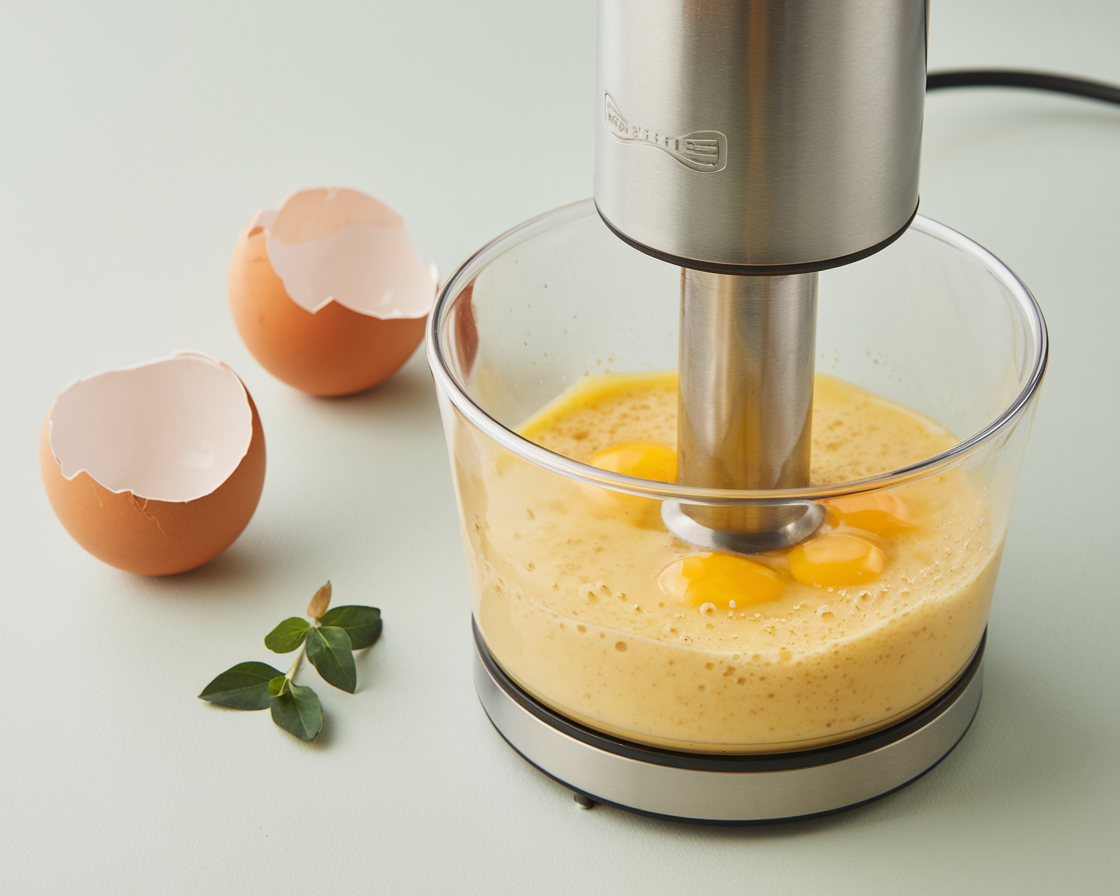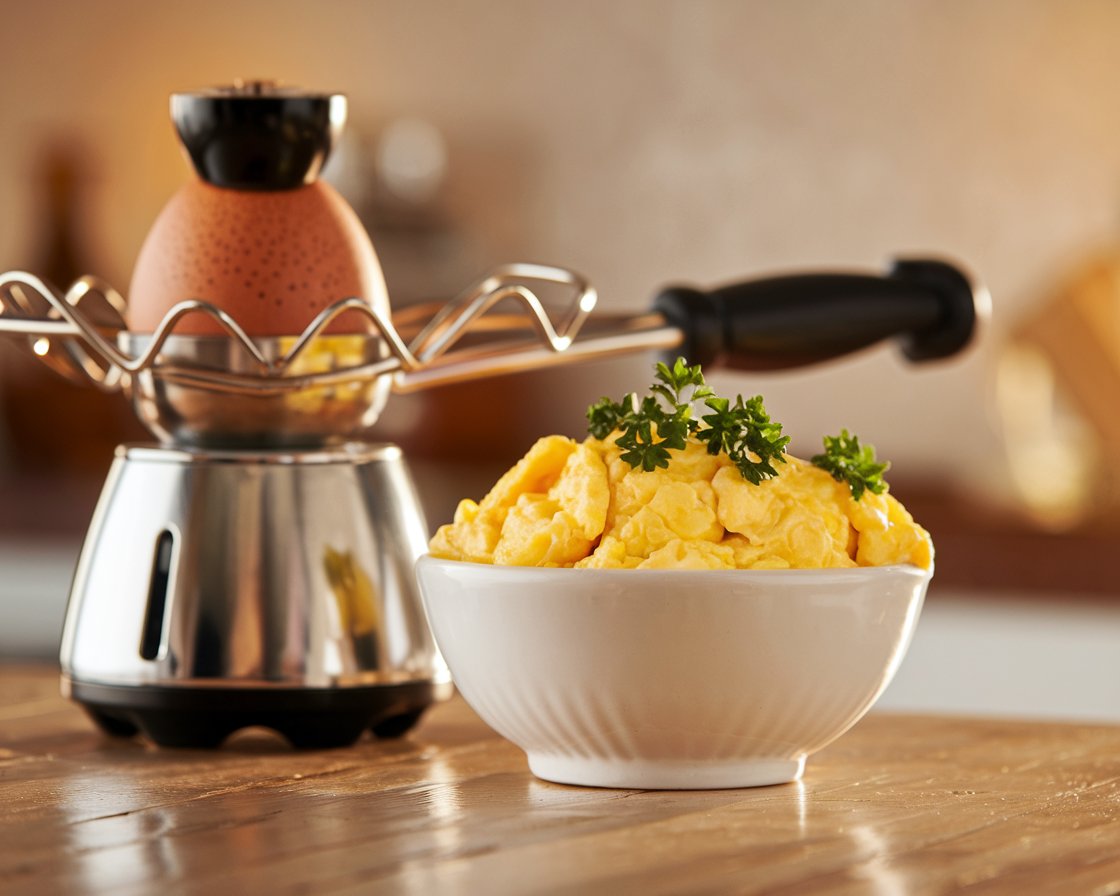Introduction to Egg Scramblers
Have you ever struggled with making perfectly scrambled eggs? Whether it’s the texture, consistency, or just the effort involved, achieving fluffy, evenly mixed eggs can sometimes feel like a challenge. Enter the egg scrambler—a simple yet brilliant kitchen tool that’s here to save the day. 🍳✨
An egg scrambler isn’t just about convenience; it’s about upgrading your cooking game. From breakfast enthusiasts to busy home cooks, this tool has become a must-have for anyone looking to streamline their mornings. But what exactly is an egg scrambler, and why should you care? Let’s crack this mystery wide open.
“An egg scrambler turns the ordinary task of whisking eggs into a quick, hassle-free experience. Perfect for beginners and pros alike!”
What Is an Egg Scrambler?
At its core, an egg scrambler is a device designed to mix eggs quickly and efficiently. It ensures that the yolks and whites blend seamlessly, creating a uniform texture ideal for scrambled eggs, omelettes, or even baking recipes. Available in both manual and electric versions, egg scramblers come in various designs to suit different needs.
Why Use an Egg Scrambler?
So, why bother with an egg scrambler when a whisk could do the job? The answer lies in the ease and consistency it offers. With an egg scrambler, you can:
- Save time during meal prep.
- Achieve perfectly blended eggs every single time.
- Minimize mess—no more egg whites spilling over your counter!
How Egg Scramblers Work
The Mechanics Behind Egg Scramblers
An egg scrambler works by using either manual or motorized mechanisms to blend eggs efficiently. Manual scramblers often have a hand crank or a pumping action that mixes the eggs inside a container. Electric scramblers, on the other hand, rely on battery power or electricity to spin a whisk or blade, ensuring fast and even mixing.
Think of it like a mini blender, but designed specifically for eggs. The result? Fluffy, light, and evenly mixed eggs ready for cooking or baking.
Types of Egg Scramblers: Manual vs. Electric
- Manual Egg Scramblers:
- Require hand operation.
- Simple, lightweight, and portable.
- Ideal for small batches of eggs.
- Electric Egg Scramblers:
- Use a motorized mechanism to do the mixing for you.
- Perfect for larger batches or those who cook frequently.
- Often come with additional features like timers or adjustable speeds.
Benefits of Using an Egg Scrambler
Speed and Efficiency
Let’s face it—life gets busy. An egg scrambler cuts down the time it takes to prep your eggs, leaving you with more time to enjoy your meal. It’s especially handy if you’re making breakfast for a family or hosting a brunch.
Consistent Results
One of the most frustrating parts of cooking eggs is inconsistency. Some bites might have too much yolk, while others are overly egg-white heavy. An egg scrambler ensures a perfect mix every time, so your scrambled eggs or omelettes turn out flawless.
Easy Cleanup
Most egg scramblers are designed with convenience in mind. Many models are dishwasher-safe or have detachable components, making cleanup a breeze. Say goodbye to sticky whisks and messy countertops.
Nutrition Facts (Scrambled Eggs Prepared with an Egg Scrambler)
| Nutrient | Per Serving (2 eggs) |
|---|---|
| Calories | 140 |
| Protein | 12g |
| Total Fat | 10g |
| Saturated Fat | 3g |
| Carbohydrates | 1g |
| Fiber | 0g |
| Sodium | 140mg |
“Using an egg scrambler isn’t just about convenience—it’s about bringing consistency and creativity to your kitchen.”
How to Use an Egg Scrambler
Step-by-Step Guide to Scrambling Eggs with a Scrambler
Using an egg scrambler is as simple as cracking an egg—literally. Here’s a quick guide to get you started:
- Crack the eggs: Break your eggs into the scrambler’s container. Most models can handle 2–6 eggs at a time.
- Add seasonings: Sprinkle in a pinch of salt, pepper, or any desired spices.
- Activate the scrambler: If it’s manual, use the hand crank or pump to mix the eggs. For electric models, press the start button.
- Mix thoroughly: Allow the scrambler to blend the eggs for 15–30 seconds or until fully mixed.
- Cook immediately: Pour the blended eggs into a heated pan for perfectly scrambled eggs.

Tips for Perfectly Scrambled Eggs
- Don’t overmix: While the scrambler makes mixing effortless, avoid overblending, as this can affect the eggs’ texture.
- Use fresh eggs: Fresh eggs result in fluffier scrambled eggs and richer flavors.
- Preheat your pan: Always cook eggs on medium heat to maintain their creamy texture.
Best Egg Scramblers on the Market
Top Manual Egg Scramblers
- Egg Master Pro: Compact and affordable, this model is ideal for quick breakfast prep.
- Whisk-O-Matic: A hand-operated scrambler with a durable build and easy cleanup.
- Eggy Whisker: Perfect for camping or travel, this scrambler doesn’t require electricity.
Best Electric Egg Scramblers
- ScramblePro 2000: Features a sleek design, adjustable speeds, and dishwasher-safe parts.
- EggFusion Deluxe: Includes a built-in timer and detachable blades for versatile use.
- ChefEase Electric Mixer: High-speed motor and ergonomic handle for effortless operation.
Features to Look for in an Egg Scrambler
- Capacity: Choose a model that suits your cooking needs, whether small or large batches.
- Ease of cleaning: Look for scramblers with detachable and dishwasher-safe components.
- Durability: Opt for high-quality materials like stainless steel or BPA-free plastic.
Common Problems with Egg Scramblers and Their Solutions
Eggs Not Fully Blended
If your eggs aren’t mixing properly, it could be due to overloading the scrambler. Try reducing the number of eggs and ensure they’re cracked evenly. For manual models, check if the mixing mechanism is functioning smoothly.
Cleaning Challenges
Some egg scramblers can be tricky to clean, especially if egg residue sticks to the blades or container. To make cleanup easier:
- Rinse immediately after use to prevent residue from drying.
- Use a bottle brush for hard-to-reach areas.
Durability Issues
If your scrambler’s mechanism feels loose or doesn’t operate as smoothly over time, it might be due to wear and tear. For long-lasting performance:
- Opt for high-quality brands.
- Avoid overexerting manual scramblers with excessive force.
“Troubleshooting your egg scrambler is easy with the right tips. A little care goes a long way in keeping your kitchen tool running smoothly.”
Creative Recipes to Try with an Egg Scrambler
Fluffy Scrambled Eggs
The classic use for an egg scrambler is, of course, fluffy scrambled eggs. Add a splash of milk or cream to the eggs before mixing for a velvety texture. Use fresh herbs like chives or parsley as a garnish for an elegant touch.
Omelette Mixes
Make omelette prep a breeze by using your egg scrambler to pre-mix the eggs with ingredients like diced onions, bell peppers, and cheese. The scrambler ensures even distribution of ingredients, so every bite is flavorful.
Pancake Batter Prep
Yes, you can use an egg scrambler for pancake batter! Blend eggs with milk and a dash of vanilla extract before adding to your dry ingredients. The result is a lump-free, smooth batter that makes perfect pancakes every time.
Perfect Breakfast Pairings with Egg Scramblers
If you’re looking to elevate your breakfast game, why not combine the versatility of egg scramblers with some delicious recipe ideas? One fantastic option is our Scrambled Eggs with Cottage Cheese Recipe. This dish takes the classic scrambled eggs and adds a creamy, protein-packed twist with cottage cheese. It’s a perfect example of how an egg scrambler can simplify the process while delivering consistent, fluffy results. Pairing this recipe with freshly made avocado toast can create a wholesome, nutrient-dense meal to kickstart your day.
Speaking of avocado toast, you don’t want to miss our Avocado Toast Recipe with Egg and Apples. This unique twist on the traditional toast combines creamy avocado with protein-rich eggs and the crisp sweetness of apples. The blend of flavors and textures complements scrambled eggs perfectly, offering a delightful balance between savory and sweet.
By incorporating these recipes, you can explore endless possibilities with your egg scrambler, making your breakfast routine more exciting and nutritious. Whether you’re hosting a brunch or simply treating yourself to a hearty start, these recipes pair beautifully and provide inspiration for crafting balanced meals. Try them together for a flavorful breakfast experience you’ll want to repeat!
Frequently Asked Questions About Egg Scramblers
Can You Use an Egg Scrambler for Other Foods?
Absolutely! While designed for eggs, many egg scramblers can handle other light mixing tasks, such as preparing batter, blending protein shakes, or mixing dressings.
How Long Does It Take to Scramble Eggs with a Scrambler?
It typically takes 15–30 seconds to fully blend the eggs, depending on the type of scrambler. Electric models are faster, while manual scramblers may require a few extra seconds of effort.
Are Egg Scramblers Dishwasher Safe?
Most egg scramblers are dishwasher safe, but it’s always a good idea to check the manufacturer’s instructions. For models that aren’t, handwashing with warm soapy water works well.
Conclusion
Egg scramblers are more than just a kitchen gadget—they’re a game-changer for anyone who loves cooking with eggs. Whether you’re a breakfast enthusiast or someone who values convenience and efficiency, this tool is worth adding to your arsenal. From perfectly blended scrambled eggs to creative recipes like omelettes and pancake batter, an egg scrambler makes every step effortless and enjoyable.
With easy cleanup, consistent results, and a variety of uses, an egg scrambler isn’t just a tool—it’s your new kitchen companion. So why not try one today? Transform your egg-cooking experience and take your meals to the next level.

